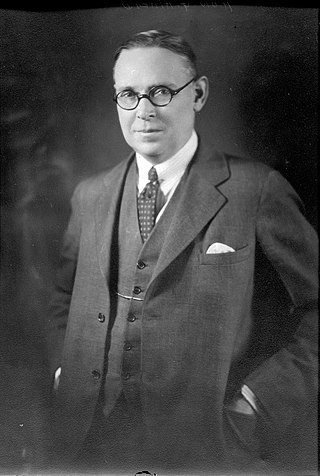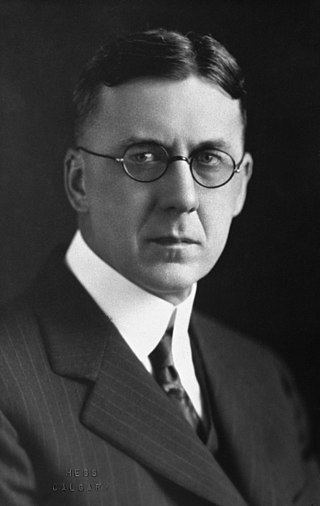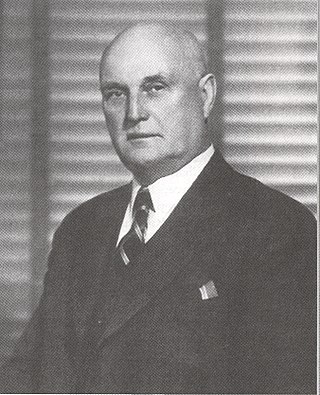Related Research Articles

Richard Gavin "Dick" Reid was a Canadian politician who served as the sixth premier of Alberta from 1934 to 1935. He was the last member of the United Farmers of Alberta (UFA) to hold the office, and that party's defeat at the hands of the upstart Social Credit League in the 1935 election made him the shortest serving premier to that point in Alberta's history.

John Edward Brownlee, was the fifth premier of Alberta, serving from 1925 until 1934. Born in Port Ryerse, Ontario, he studied history and political science at the University of Toronto's Victoria College before moving west to Calgary to become a lawyer. His clients included the United Farmers of Alberta (UFA); through his connection with that lobby group, he was involved in founding the United Grain Growers (UGG).

Herbert W. Greenfield was a Canadian politician and farmer who served as the fourth premier of Alberta from 1921 until 1925. Born in Winchester, Hampshire, in England, he immigrated to Canada in his late twenties, settling first in Ontario and then in Alberta, where he farmed. He soon became involved in the United Farmers of Alberta (UFA), a farmers' lobby organization that was in the process of becoming a political party, and was elected as the organization's vice president. Greenfield did not run in the 1921 provincial election, the first provincial general election in which the UFA fielded candidates, but when the UFA won a majority in the Legislature in that election he was chosen by the UFA caucus to serve as Premier. Like most of the UFA caucus, Greenfield had no experience in government and he struggled in the position.

Charles Stewart, was a Canadian politician who served as the third premier of Alberta from 1917 until 1921. Born in Strabane, Ontario, in then Wentworth County, Stewart was a farmer who moved west to Alberta after his farm was destroyed by a storm. There he became active in politics and was elected to the Legislative Assembly of Alberta in the 1909 election. He served as Minister of Public Works and Minister of Municipal Affairs—the first person to hold the latter position in Alberta—in the government of Arthur Sifton. When Sifton left provincial politics in 1917 to join the federal cabinet, Stewart was named his replacement.

The United Farmers of Alberta (UFA) is an association of Alberta farmers that has served different roles in its 100-year history – as a lobby group, a successful political party, and as a farm-supply retail chain. As a political party, it formed the government of Alberta from 1921 to 1935.

The 1921 Alberta general election was held on July 18, 1921, to elect members to the 5th Alberta Legislative Assembly. It was one of only five times that Alberta has changed governments.

The 1935 Alberta general election was held on August 22, 1935, to elect members of the Legislative Assembly of Alberta. The newly founded Social Credit Party of Alberta won a sweeping victory, unseating the 14-year government of the United Farmers of Alberta. It was one of only five times that Alberta has changed governments.

Peace River is a provincial electoral district in Alberta, Canada. The district is mandated to return a single member to the Legislative Assembly of Alberta using the first past the post method of voting. The district used instant-runoff voting from 1926 to 1957.

Jean Léon Côté was a prominent French-Canadian politician. He served as a member of the Legislative Assembly of Alberta from 1909 until 1923 sitting with the provincial Liberal Party in both government and opposition. He vacated his provincial seat when he was appointed to the Senate of Canada in 1923. He served until his death in 1924 sitting with the federal Liberal caucus.

Lucien Boudreau was a politician, mayor of St. Albert, Alberta, and member of the Legislative Assembly of Alberta.

Donald MacBeth Kennedy was a Canadian farmer as well as a provincial and federal level Canadian politician representing Albertans. He was a UFA MLA 1921-1922 and a Progressive/UFA MP 1921–1935.
Halvar de la Cluyse Jonson was a teacher and high school principal. He was also a long serving provincial politician from Alberta, Canada. He served as a member of the Legislative Assembly of Alberta and cabinet minister in the provincial government from 1982 until 2004.

The John Brownlee sex scandal occurred in 1934 in Alberta, Canada, and forced the resignation of the provincial Premier, John Edward Brownlee. Brownlee was accused of seducing Vivian MacMillan, a family friend and a secretary for Brownlee's attorney-general in 1930, when she was 18 years old, and continuing the affair for three years. MacMillan claimed that the married premier had told her that she must have sex with him for his own sake and that of his invalid wife. She had, she testified, relented after physical and emotional pressure. Brownlee called her story a fabrication, and suggested that it was the result of a conspiracy by MacMillan, her would-be fiancé, and several of Brownlee's political opponents in the Alberta Liberal Party.

John Edward Brownlee was Premier of Alberta, Canada, from 1925 to 1934 as leader of the United Farmers of Alberta (UFA) caucus in the Legislative Assembly of Alberta. After a number of early successes, his popularity and his government's suffered from the hardships of the Great Depression. In 1934, he was embroiled in a sex scandal when a family friend sued him for seduction. Though Brownlee denied the events she alleged, when the jury found in her favour he announced his resignation as premier.

Vernor Winfield Smith was a politician in Alberta, Canada who served as the province's Minister of Railways and Telephones from 1921 until 1932. Born in 1864 in Prince Edward Island, he moved to British Columbia in 1883 where he worked for several railway companies as an accountant. In 1915 he moved to Camrose, Alberta to become a farmer. The same year, he married Lily Bury, with whom he would have five children.

John Farquhar Lymburn was a Canadian politician who served as Attorney-General of Alberta from 1926 until 1935. Born and educated in Scotland, he came to Canada in 1911 and practiced law in Edmonton. In 1925, John Edward Brownlee became Premier of Alberta, and sought a lawyer without partisan affiliation to succeed him as attorney-general. Lymburn accepted the position, and was elected to the Legislative Assembly of Alberta in the 1926 election. As attorney-general, Lymburn took part in negotiations between the Alberta and federal governments over natural resource rights, prepared Alberta's submission in the Persons case, and played a minor role in the sex scandal that forced Brownlee from office. In the 1935 provincial election, Lymburn and all other United Farmers of Alberta candidates were defeated, as William Aberhart led the Social Credit League to victory. Lymburn made an unsuccessful attempt to return to the legislature in 1942, and briefly returned to prominence during the Bankers' Toadies incident, before dying in 1969.

Edith Blanche Rogers was a Canadian politician who served as a member of the Legislative Assembly of Alberta from 1935 until 1940. Born in Nova Scotia, she came west to Alberta to accept a job as a teacher. She later moved to Calgary where she encountered evangelist William Aberhart and became a convert to his social credit economic theories. After advocating these theories across the province, she was elected in the 1935 provincial election as a candidate of Aberhart's newly formed Social Credit League.
James "Bud" Edgar Miller was a provincial level politician and farmer from Alberta, Canada. He served as a member of the Legislative Assembly of Alberta from 1971 to 1986. During his time in provincial office he served in the Executive Council as the Minister of Public Lands and Wildlife from 1975 to 1982.

John Edward Brownlee served as Attorney-General of the province of Alberta in western Canada from 1921 until 1926, in the United Farmers of Alberta (UFA) government of Herbert Greenfield. As Brownlee was the only lawyer in a caucus formed almost entirely of farmers, his role extended beyond the traditional expectations of an attorney-general, and ranged from providing legal advice to explaining how to write a business letter; he also became the government's de facto leader in the Legislative Assembly of Alberta.

William Legh Walsh was a Canadian lawyer and judge. He was the fourth lieutenant governor of Alberta from 1931 to 1936.
References
- ↑ Catalogue of Kentucky University. Kentucky University. 1899. p. 110. Retrieved August 11, 2017.
- 1 2 3 "Legislator Died in Hour of Victory". The Boston Globe . Calgary. July 20, 1921. p. 2. Retrieved January 5, 2020– via Newspapers.com.
- "Percival Baker". Dictionary of Canadian Biography (online ed.). University of Toronto Press. 1979–2016.